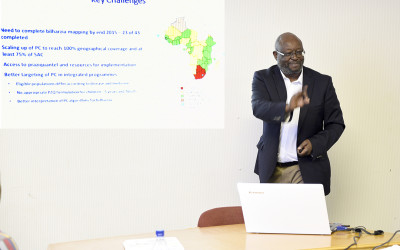News
PhD thesis on HIV susceptibility related to HIV target cells and cervical ectopy
A study of South African women living in a rural area endemic of urogenital schistosomiasis. PhD Candidate Elisabeth Kleppa of University of Oslo successfully defended her PhD with opponents Agnes Chenine and Per Kallestrup. More than 110 million Africans are estimated to be infected with Schistosoma (S.) haematobium, but it is still one of the so-called “neglected tropical diseases”. Poor countries bear the majority of the disease burden, contributing to the maintenance of the cycle of poverty. In Africa, women are at a higher risk of human immunodeficiency virus (HIV) infection than men, and this cannot be explained by behavioural factors alone. Biological risk factors seem to contribute to the differences in HIV prevalence between geographical regions and genders. This thesis will focus on female genital schistosomiasis and cervical ectopy, both factors hypothesised to facilitate the transmission of HIV through the genital mucosa. Genital schistosomiasis in women is characterized by lesions referred to as “sandy patches” that appear grainy or homogenous and are thought to be caused by the deposition of ova in the genital tissues. Sandy patches are often associated with abnormal mucosal blood vessels and contact bleeding due to the fragile mucosa. Cervical ectopy and female genital schistosomiasis (FGS) may be diagnosed by photocolposcopic examination, and both conditions are likely to be present before sexual debut. In addition to increased susceptibility to HIV infection, S. haematobium infection has been suggested to accelerate the progression of HIV infection, possibly through increased immune activation. In this study, South African women attending high schools in KwaZulu-Natal were included. Blood, urine and cervical lavage samples were collected and a photocolposcopic examination... read moreFunding for Ebola hides decline in funding
Public funding for neglected disease research and development was actually at its lowest level in seven years, with public funding for non-Ebola R&D dropping by $62m in 2014. As the world’s biggest funder of neglected disease R&D, much of this decline has been driven by the US Government. US Government funding for non-Ebola neglected disease R&D fell again in 2014 – further extending the large sequester-related cuts of the previous year – to be nearly a quarter of a billion dollars ($221m) below its 2009... read moreUgu District at the forefront
Child stunting, anaemia, impaired learning ability and the negative impact on health and socio-economic status may be prevented by correct treatment and Sister Siphumile Mlambo, CDC Ugu, informed us that South Africa is one of the five countries – worldwide – that has yet to map the presence of the worm diseases. In order to curb the devastating health consequences of worms some areas might need mass-treatment. Ugu District has been the first to pilot mass-treatment in some schools the last decade. However many areas in South Africa are unexplored and therefore urine and faeces must be collected in each of South Africa’s 52 districts. This will make it possible to decide on the best treatment strategies for the different areas. Ugu District Department of Health: Deputy District Manager, Sister Thoko Ntuli emphasised the importance of a multi-disciplinary approach to managing urogenital Bilharzia and the soil-transmitted helminths (intestinal worms). Dr Lester Chitsulo (Geneva/Malawi) who has worked on Female Genital Schistosomiasis and so-called Neglected Tropical Diseases for the World Health Organisation presented the plight of children with schistosomiasis and discussed the necessity for early management of disease. Dr Femi Olowookorun, Ugu District Medical Officer, spoke about the possible intervention points in the wake of the upcoming infant syrup for treatment of the disease. The BRIGHT team (University of KwaZulu-Natal) presented the latest news in research and also gave a practical approach to teenagers in need of health services. A lively discussion ensued, especially as Dr. Patricia Ndhlovu, Imperial College, UK, spoke about the hot spots of infested rivers near some of our local schools. Sister Siphumile Mlambo Dr Femi Olowookorun BRIGHT team, Sister Nombeko Mpofana (below)... read moreIndicators of anaemia in under-fives with malaria at a hospital in northern Cameroon
Jourdan PM, Laoussou P, Lybie A, Kjetland EF
Prevention of gynecologic contact bleeding and genital sandy patches by childhood anti-schistosomal treatment
Kjetland EF, Ndhlovu PD, Kurewa EN, Midzi N, Gomo E, Mduluza T, Friis H, Gundersen SG
Prevalence of urinary schistosomiasis and HIV in females living in a rural community of Zimbabwe: does age matter?
Ndhlovu PD, Mduluza T, Kjetland EF, Midzi N, Nyanga L, Gundersen SG, Friis H, Gomo E



